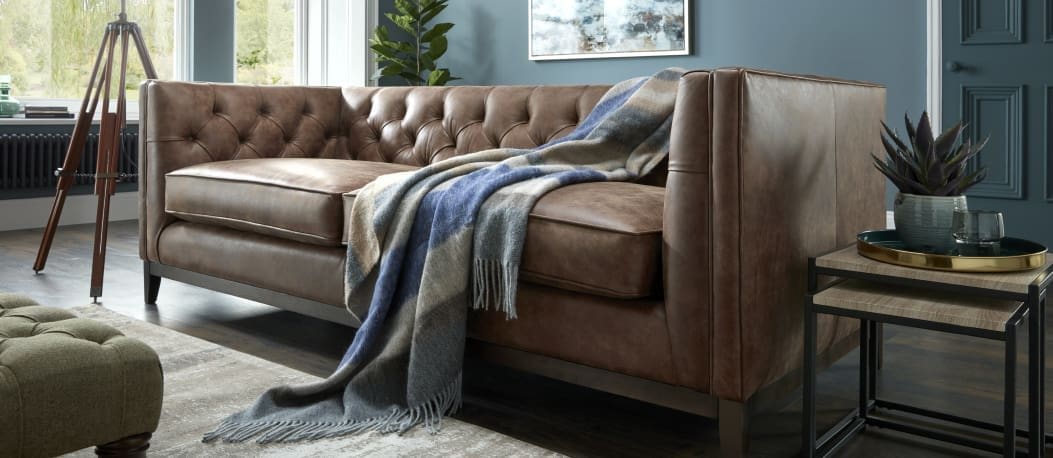The journey of the Indian leather industry can be traced back to time immemorial. Right from the dawn of the primitive man to the middle ages, from the ancient history to the 21st century, leather has been creating its own prominent place in the country. Noticeably, within the last decade, a substantial progression in leather applicability has evolved within the Indian society. From being a predominantly luxury item that was utilised in manufacturing some of the most distinguished luxury centric, bags, belts, handicrafts, apparels and shoes; leather has now gained momentum to being a viable and prestigious furniture item.
The Indian furniture market is anticipated to reach USD 32.61 billion (SGD 44.6 billion) by 2018 by registering a CAGR of 13.38 per cent during the forecast period of 2018-2023. Moreover, the market is expected to garner USD 61.09 billion (SGD 83.6 billion) by the end of 2023. Further, the India furniture market is anticipated to achieve a year-over-year growth rate of 14.3 per cent in 2023 as compared to the previous year.
An anticipated mind-set that imagined leather furniture being difficult to maintain, exorbitantly priced, owing to the fact that such an item can only be sourced from of the finest cities in the world, Italy and Spain; has transformed a wide range of consumer perceptions. Consumers are rapidly demanding influential leather furniture with a desire to enjoy luxury. The international upholstery sub-sector has changed the dynamics of the Indian leather industry which is seeing prospects and positive opportunities in manufacturing traditional, transitional and modern furniture, that oozes comfort and opulence like no one else, right here in India.
With a growing exposure to the West as well as to reap the benefits of an open market, people everywhere aspire to own luxury items. There was once a time when many suppliers would prey upon the fact that consumers did not know anything, therefore would dupe them by selling low-quality items at high prices, but there were many who thought otherwise. Today, India is at forefront of functioning as a thriving leather market. The quality and craftsmanship that was once expected from international countries are now pretty much gaining an appeal within the country. This is majorly because brands are creating a seamless blend of luxury and affordability to ensure desirable products are no longer left a dream. We may not be yet at par with Italian tanneries, but Indian tanneries are definitely not far behind.
You really don’t have to burn a hole in your pocket by purchasing an Italian leather sofa or a lounger. Neither do you have to just whine over the desirable attributes of this material just because you think it’s out of your reach. Today, people are able to own products that don’t come with hefty and unfounded price tags. You can just head over to Indian leather furniture market to get a high-quality fashion-oriented leather sofa at an affordable price.
Technological advancements such as the availability of high-speed internet networks such as 4G and the spiked absorption of smart gadgets have been boosting the retail sector in India. These advancements have made it easier and more convenient for customers to buy furniture through online channels. In addition to this, the rising number of smartphone users across the country and the increase in online shopping has encouraged furniture industry players to introduce their products through online channels.
Every leather item is crafted painstakingly in India and supplied to the world over. Right from the initial frame, to the leather upholstering, to the detailed finishing, artisans work tirelessly to give clients a product that they can proudly call their own.
From delectable seating options to eye-catching leather clad bars, everything is being produced and sold in India. With still a large society of talented craftsmen thriving in the country, the consumer can procure premium leather home and lifestyle furniture items which are a piece of beauty and grace. It is no kidding, that the leather industry is giving more employment opportunities, especially to women that are helping our proud design traditions take centre stage. The potential of the Indian leather furniture is as versatile as leather itself. When the same quality, craftsmanship and durability are available right here then owning leather furniture is no longer a far-fetched dream.
Another interesting factor that is impacting the performance of the leather furniture industry is that consumers are looking forward to breaking the monotony of wooden furniture with a new design paradigm. Unlike fabric, it improves with age, and unlike wood, it retains its shape over the years and is not even high maintenance.
The kind of life and charm leather furniture brings to any corner of your room, is not something wood always gives. People are excited about leather. They have broken myths about leather. It is a material that is durable, flexible, strong, friction resistance and with the possibility of being prepared resistant to heat and water. The leather is out there revolutionising the industry by combining quality with good value for money.
As a consequence, we believe the industry and demand for leather furniture are very much steered towards an upward growth. Today, Tamil Nadu exports more leather products then the other states of India. Therefore, India earns more annual turnover through the leather industry, becoming a major centre of focus. With the state and its capital getting identified with the modern segment of the leather industry in India, the rest of the country will soon emulate.
Reference:
Sanmax. (n.d.). The Furniture Industry in India, 2019 to 2023: Vendors Generating Significant Revenue Through Online Platforms. Retrieved August 11, 2020, from https://www.panelsfurnitureasia.com/en/news-archive/the-furniture-industry-in-india-2019-to-2023-vendors-generating-significant-revenue-through-online-platforms/2888
Gupta, V. (2018, April 18). How the Indian Leather Furniture Market is Going Global. Retrieved August 11, 2020, from https://www.entrepreneur.com/article/312142

